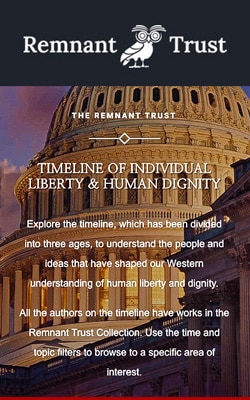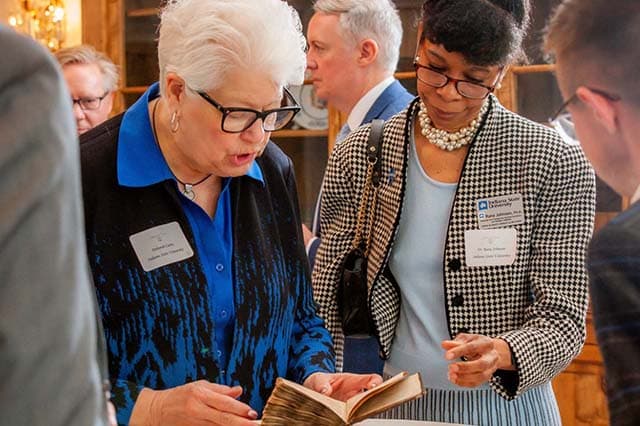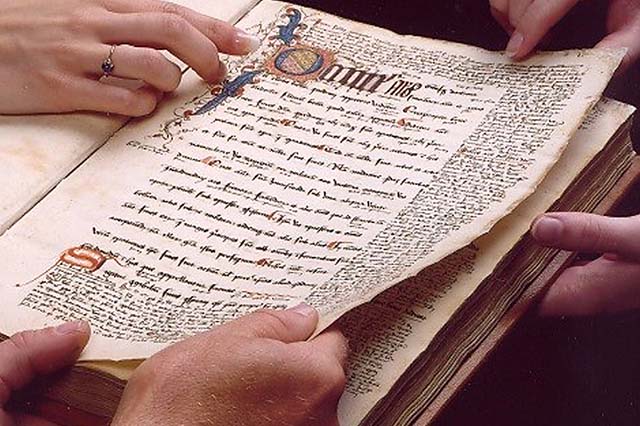WHO IS THE REMNANT TRUST?
The Remnant Trust is a Public Educational Foundation.
We were founded to preserve and share our growing collection focusing on individual liberty and human dignity.
The Trust is a public educational Foundation that shares an actively growing collection of manuscripts, 1st edition, and early works dealing with the topics of individual liberty and human dignity, with some pieces dating as early as 2500 BCE. We make our collection available to colleges, universities, professional, civic, and other organizations for use by students, faculty, scholars, and the general public.
Our growing collection of manuscripts, 1st edition, and early works dates back as early as 2500 BCE.
Following along a timeline of liberty and dignity, our collection is comprised of some of the greatest works of man that focus on the proper function of government, responsibility of citizenship, and how we live together in society.
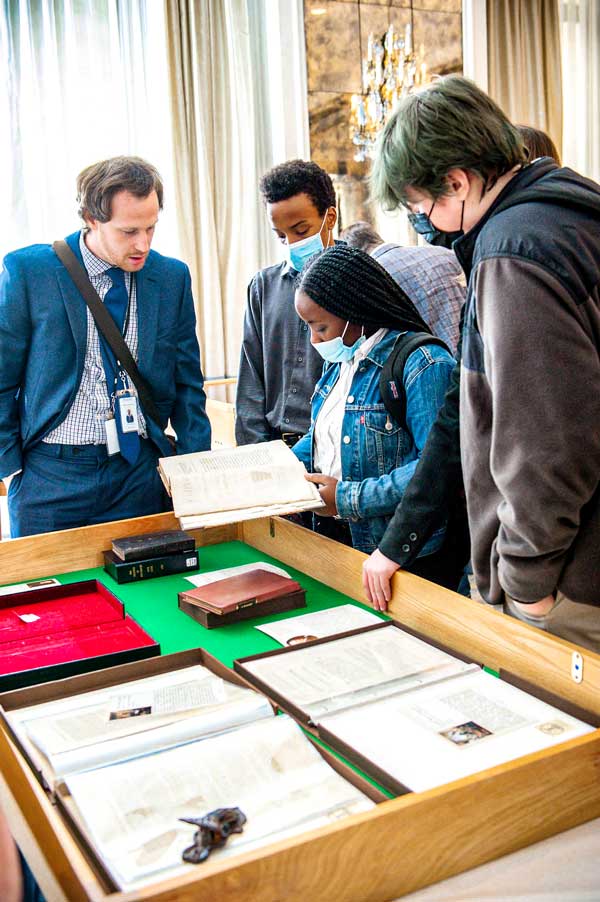

“The mission of The Remnant Trust is to elevate educational standards & the public’s understanding of individual liberty & human dignity through the precedent setting, hands on availability of the world’s great ideas in original form… more ”
WHAT DOES THE REMNANT TRUST DO?
We are passionate about growing, preserving and sharing these rare documents.
Protecting and Sharing Great Works and Ideas of Liberty and Human Dignity
The Remnant Trust collection began more than three decades ago by Founder Brian Bex. Deeply passionate about individual liberty and human dignity, he identified the 100 most important works speaking to these topics, gaining input from scholars.
The Trust has since been dedicated to our mission to elevate educational standards and the public’s understanding of individual liberty and human dignity through the precedent-setting, hands-on availability of the world’s great ideas in original form—and raising the consciousness of the most significant documents that have shaped America: The Great Experiment.
Today, The Remnant Trust’s Wisdom of the Ages Athenaeum is a preeminent privately funded collection of over 1,600 original and early version texts about individual liberty and human dignity putting forth a body of ideas, moral habits and beliefs, conventions and customs of the past to bridge time itself.
The Remnant Trust’s vision has always been to provide the opportunity for people to hold, examine, read and discuss the pieces of the collection.
Our Holdings / Volumes
Manuscripts
Exhibitions
Years / Time Line
Preserving Ideas of Individual Liberty & Human Dignity
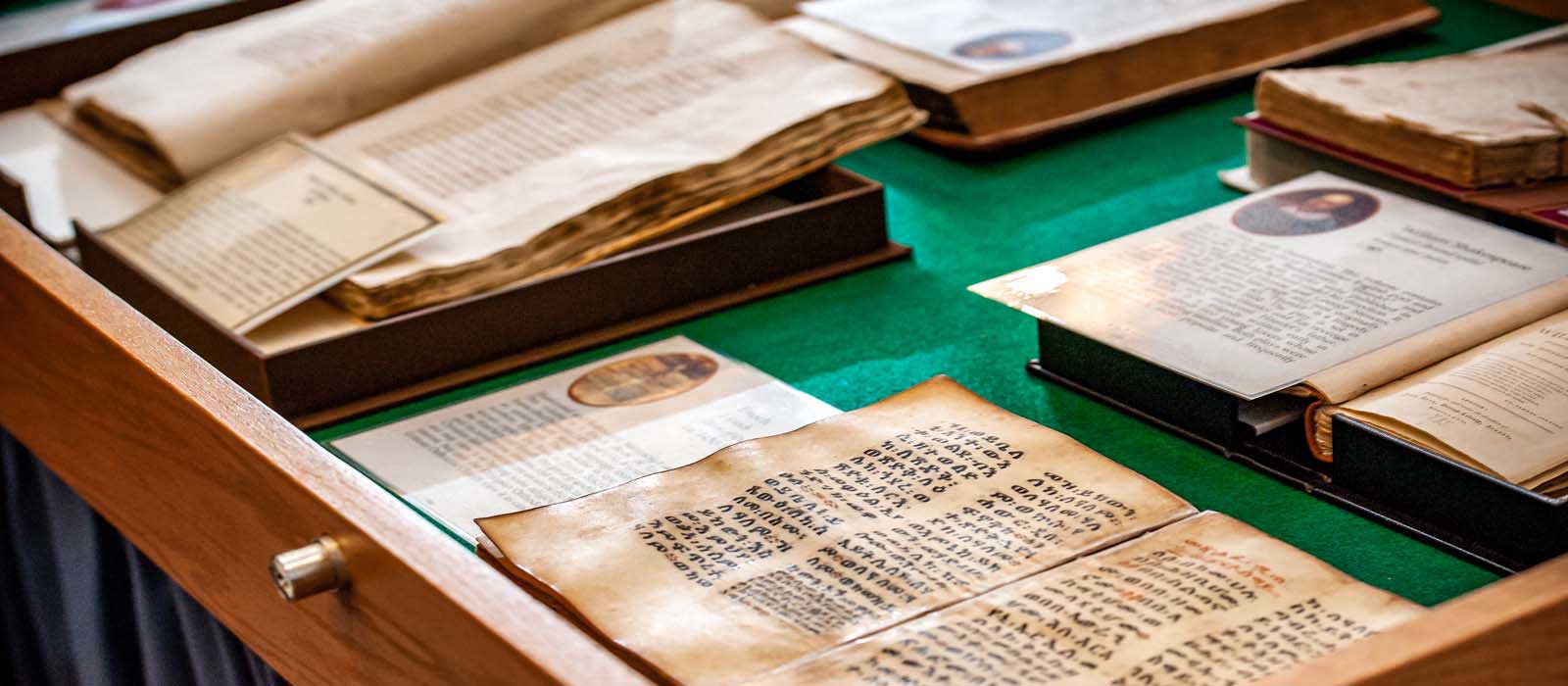
The Trust is distinctive because audiences directly interact with the collection and engage in programs and discussions to expand their knowledge and build community. Participants are transformed as they experience the magnitude of the Trust’s historic, centuries-old texts and learn directly about liberty and human dignity from sages spanning four-and-a-half millennia.
WHY DO WE DO THIS?
Unleashing Passion and Curiosity for Individual Liberty and Human Dignity
The Challenge today is to . . .
Prepare this generation to draw on the accumulated wisdom and experience of the past in order to deal with the enduring questions in the new circumstances of the 21st century. In meeting this challenge our strategy is to provide exposure to original sources of the most significant documents that have shaped society; inspire an interest and competency in issues of individual liberty and dignity; engage in civil discussion and debate regarding the great ideas of historical minds.


“If all mankind minus one, were of one opinion, and only one person were of the contrary opinion, mankind would be no more justified in silencing that one person, than he, if he had the power, would be justified in silencing mankind.”
― John Stuart Mill, On Liberty

The Remnant Trust’s officers and staff come from all walks of life and different backgrounds but we share a common interest and understanding for the need to have all sides to be represented in The Collection so individuals can form their own opinions and ideas.
No one person owns The Collection, The Remnant Trust, Inc. organization owns and preserves it.

THE REMNANT TRUST BLOG
Featured Works
On Liberty by John Stuart Mill
Featured Work First Edition. “On Liberty” is John Stuart Mill’s classic defense of freedom where Mill attempts to apply his system of Utilitarianism to society and the state and tries to establish the principle values of relationship between authority and liberty. In...
Utopia by Thomas More
Featured Work Fourth Corrected Edition in English. This edition of Thomas More's "Utopia" is entitled "Sir Thomas Moore's Utopia: Containing an Excellent, Learned, Wittie, and Pleasant Discourse of the Best State of a Publike Weale, as it is Found in the Government of...
The Constitution of the Pennsylvania Society, for Promoting the Abolition of Slavery, and the Relief of Free Negroes, Unlawfully, Held in Bondage.
Featured Work First Edition. Written by Benjamin Franklin and Benjamin Rush and published in 1787. The society was founded on April 14, 1775 in Philadelphia, Pennsylvania as the Pennsylvania Society for the Relief of Free Negroes Unlawfully Held in Bondage and was the...
A Vindication of the Rights of Woman by Mary Wollstonecraft
Featured Work First Edition. "A Vindication of the Rights of Woman" is one of the earliest and most famous works on feminism. Written in approximately six weeks by Mary Wollstonecraft after she read Charles Maurice de Talleyrand-Périgord's 1791 report to the French...
The Federalist by Alexander Hamilton, James Madison and John Jay
Featured Work First Edition, with volumes I and II bound together. This influential work on politics and government was published in 1788 in book form, entitled, "The Federalist: A Collection of Essays, Written in Favour of the New Constitution, as Agreed upon by the...
The Mathematical Principles of Natural Philosophy by Isaac Newton
Featured Work First Edition in English in two volumes. This edition was translated by Andrew Motte and includes "The Laws of the Moon's Motion, According to Gravity" by John Machin. It was printed two years after Newton's death and includes forty-nine engraved folding...
